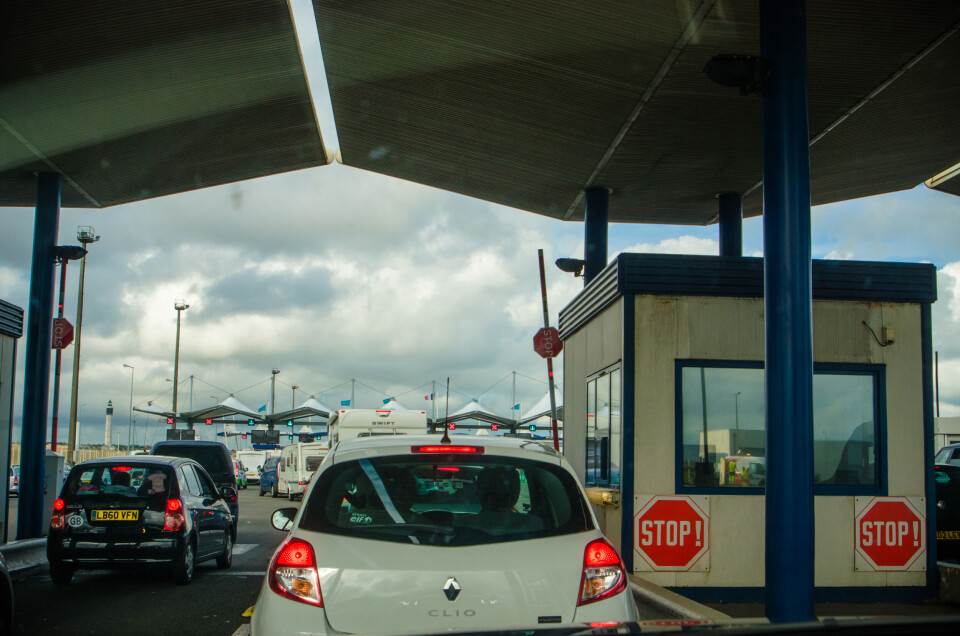-
Exploring Pont-Croix: officially named as France’s best tourism village
A Breton gem boasting strong cultural heritage, charming architecture and vibrant local life
-
Sleep in a 100-year-old railway carriage at a former Brittany station
Refurbished railway compartment can sleep up to 11 people at a time
-
Brexit residency card renewals: 12 confusion points and solutions
We look at timing for applications, documents needed (and not needed) and what rights if card is delayed
What caused this weekend’s six-hour Calais ferry queues?
Waiting times are back to normal after British passengers returning home from summer holidays on Saturday and Sunday were affected by long delays

Ferry operators have apologised for the up to six-hour queues that British people returning from summer holidays experienced at Calais over the weekend.
Traffic conditions were back to normal earlier this morning (September 5), with DFDS stating that the waiting time was 30 minutes. This has since risen to 45 minutes, but all services appear to be running on time at this stage.
CALAIS PORT | Current queue time at border control is 45 minutes. Please allow plenty of time to complete the check in process at the Port 🚢 pic.twitter.com/fcdASqfjT9
— DFDS Live Travel Updates (@DFDSLiveUpdates) September 5, 2022
DFDS has nonetheless encouraged passengers to “allow plenty of time to complete the check in process”.
The weekend’s delays began on Saturday night (September 3), coming as a result of post-Brexit border controls according to ferry operators, who warned of continued disruption on Sunday.
On Saturday, P&O Ferries tweeted: “We apologise for the wait times this evening in Calais. This is due to queues at border control.
“We have put on an additional sailing to accommodate all those that have been stuck in queues.”
On Sunday morning, the firm recommended that passengers leave “as much time as possible” – at least two hours – to get through passport checks. On Saturday night, this wait had been estimated at three hours, but several passengers stated that they had been in queues for five or six hours.
DFDS also warned of waiting times of five hours.
PORT UPDATES|
— DFDS Live Travel Updates (@DFDSLiveUpdates) September 3, 2022
DUNKIRK: Traffic is free flowing through check-in and border controls
CALAIS: Queues at check-in, queues of up to 5 hours at border controls.
DOVER: Traffic is free flowing through border controls and check-in. pic.twitter.com/Uu1Y9QsruU
One passenger told the BBC that the queues had “little to do with the amount of people but with the poor layout and no traffic control.”
Huge snarl-up at Calais. No queues before DFDS, no queues for French Border Control, but have now spent over an hour queuing at UK Border Control. Hundreds of checked-in cars missing their ferries. Don’t know what lane to go to when we’re through as the ship has sailed! #brexit
— Deborah Hockey (@debbiehockey) September 4, 2022
A spokesperson for the Port of Calais said: “Calais was affected by ‘the perfect storm’ of summer volumes in combination with post-Brexit border checks, causing six hours of queuing.
“We worked together with partners to reduce the queues as quickly as we could.”
More British Border Force officials were brought to Calais as reinforcements on Saturday evening to help tackle the queues, which had formed because there were not enough booths in operation to cope with passenger numbers.
In July ferry passengers heading for France had to wait up to six hours for passport control at Dover, with the UK government accusing French border control of a lack of preparedness, while French minister Clément Beaune said that “France is not responsible for Brexit”.
Read more: French minister’s reaction to Dover: Don’t blame us for Brexit
Read more: Port of Dover queues: A one-off or a long-term problem?
Why were British passengers caught in queues?
Since the UK left the EU, British citizens have been subject to more detailed passport checks when travelling into and out of the bloc, meaning that border control officers take around half a minute longer to examine each document.
Read more: Explainer: How has Brexit changed UK passport checks at EU borders?
Before the UK left the EU, British citizens had an automatic right to move freely within the bloc.
The UK was not in the Schengen zone, so there were still border checks, but they were minimal.
Therefore, they would often be waved through passport control at Dover after officers looked quickly at their passports.
Now, French border control staff are responsible for carrying out several different checks on passports, including making sure that the person’s identity corresponds with their details, and that they have not been in the EU for more than 90 days in the past 180 – unless they have a visa or residence permit.
Border control officers may not always carry out all of these checks, but the process will nonetheless last longer.
When there are tens of thousands of people passing through the port each day, this can create congestion.
Welcome to Calais port and welcome to brexit pic.twitter.com/wooNUp5fKl
— ciaran the euro courier 🇪🇺🇮🇪 (@vanmaneuro) September 3, 2022
Related articles
Can US and UK travellers use e-gates at French airports?
French authorities say technical issue led to Dover staff shortages
Dover traffic backlog now cleared but warnings of future delays
























